Could Your Night Sweats Be a Sign of Lymphoma?
Could Your Night Sweats Be a Sign of Lymphoma?
The Lymphoma Link
Night sweats are often associated with lymphoma, a type of blood cancer. Understanding this connection could lead to earlier diagnosis and better outcomes.
Contents
- What is Lymphoma?
- The Lymphoma-Night Sweat Connection
- Other Lymphoma Red Flags
- Diagnosis and Next Steps
What is Lymphoma?
Lymphoma is a cancer that starts in the lymphatic system, a part of your body's germ-fighting network. There are two main types: Hodgkin lymphoma and non-Hodgkin lymphoma. Both can cause night sweats, but they're not the only symptoms to watch for.
The Lymphoma-Night Sweat Connection
Night sweats are one of the classic 'B symptoms' of lymphoma, along with unexplained fever and weight loss. These sweats are often described as 'drenching' - severe enough to soak through pajamas and bedding. While not everyone with lymphoma experiences night sweats, they're a common early sign that shouldn't be ignored.

Other Lymphoma Red Flags
Besides night sweats, lymphoma can cause swollen lymph nodes, fatigue, and itching. Some people with Hodgkin lymphoma experience pain in lymph nodes after drinking alcohol. If you're experiencing these symptoms along with night sweats, it's crucial to see a doctor for evaluation.
Diagnosis and Next Steps
If lymphoma is suspected, your doctor will likely order blood tests and imaging studies like CT scans. A biopsy of an enlarged lymph node is usually necessary for a definitive diagnosis. Remember, while night sweats can be a symptom of lymphoma, they have many other potential causes, so don't panic - but do get checked out.
FAQs
Are night sweats always a sign of lymphoma?
No, many conditions can cause night sweats, but persistent sweats warrant evaluation.
How common is lymphoma?
Lymphoma accounts for about 4% of all cancers diagnosed in the US.
Can lymphoma be cured?
Many lymphomas are treatable, with some types having high cure rates.
Do all lymphoma patients experience night sweats?
No, not all patients have night sweats, but they're a common symptom.
At what age does lymphoma typically occur?
Lymphoma can occur at any age, but risk increases after age 50.
Key Takeaways
While night sweats alone don't necessarily mean you have lymphoma, they're an important symptom that shouldn't be ignored, especially when combined with other warning signs.
Additional References
- Kenemans P. Menopause, HRT and menopausal symptoms. J Epidemiol Biostat 1999; 4:141.
- Miller LG, Asch SM, Yu EI, et al. A population-based survey of tuberculosis symptoms: how atypical are atypical presentations? Clin Infect Dis 2000; 30:293.
This article has been reviewed for accuracy by one of the licensed medical doctors working for Doctronic.











